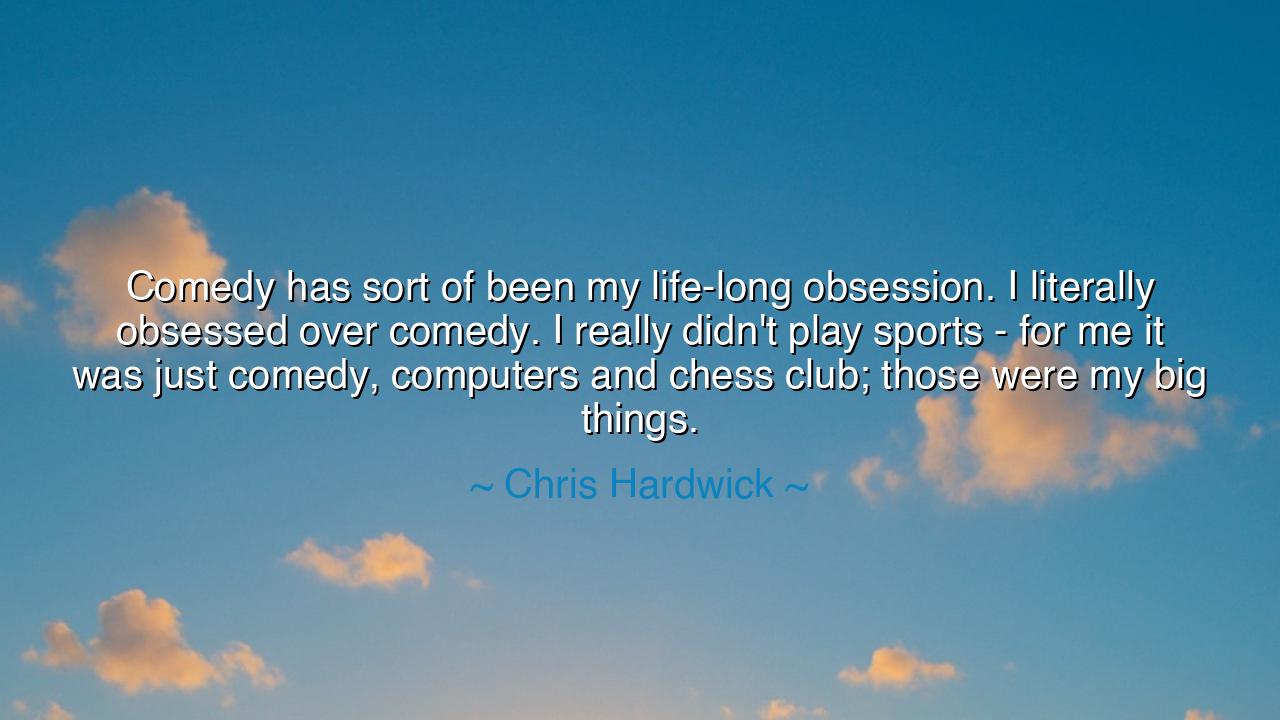
Comedy has sort of been my life-long obsession. I literally
Comedy has sort of been my life-long obsession. I literally obsessed over comedy. I really didn't play sports - for me it was just comedy, computers and chess club; those were my big things.






The modern philosopher of laughter, Chris Hardwick, once confessed with humble honesty: “Comedy has sort of been my life-long obsession. I literally obsessed over comedy. I really didn’t play sports—for me it was just comedy, computers, and chess club; those were my big things.” At first, his words may seem lighthearted—a simple reflection of youth and passion—but within them lies the eternal truth of devotion, identity, and the power of finding one’s calling in a world that often misunderstands the heart’s true pursuits. Hardwick’s statement is not only about humor—it is about the courage to follow one’s obsession when the world points elsewhere.
In the ancient world, those who pursued unusual callings were often seen as outcasts. The sculptor was mocked by soldiers, the philosopher by merchants, the poet by kings. Yet time proved that the hands that shaped marble, the minds that questioned truth, and the tongues that sang of beauty were the ones that carried civilization forward. So too did Hardwick, as a boy among athletes, choose not the field but the stage of the imagination. His comedy, computers, and chess were not distractions—they were disciplines of mind and heart. For in each, he found the same thread: pattern, timing, precision, and creativity. He was not avoiding sport; he was training for a different kind of contest—the lifelong game of wit and understanding.
To obsess is often seen as folly, but when that obsession is guided by passion and purpose, it becomes a forge for greatness. Hardwick’s confession reveals the fire that has kindled every artist and inventor through time. Consider Leonardo da Vinci, who as a youth cared little for war or politics, but filled his notebooks with sketches of birds, machines, and anatomy. The world around him did not see the purpose in his curiosity—but his obsession built bridges between art and science that still endure. So too does the comedian’s obsession build bridges between sorrow and laughter, between confusion and clarity. For comedy, as Hardwick lived it, is not mere jest—it is philosophy wrapped in joy, truth spoken through laughter.
Comedy, in its essence, is the art of seeing clearly. The comedian peers into the ordinary and reveals its absurdity, its beauty, its human truth. Hardwick’s life-long devotion mirrors the path of the ancient fools and jesters, who, under the guise of humor, told kings the truths that courtiers dared not speak. They wielded laughter like a lantern, casting light into the dark corners of pride and fear. To dedicate one’s life to this craft—to obsess over timing, tone, and truth—is no small thing. It is, in its way, the pursuit of enlightenment through mirth.
The mention of computers and chess alongside comedy is no accident. Each requires structure, pattern, and precision. The comic, like the programmer or the chess player, must think many moves ahead. Every punchline is a calculated strike; every pause is a breath of strategy. In this trinity of Hardwick’s youth—comedy, computers, and chess—we see the union of logic and laughter, intellect and imagination. He reminds us that passion need not fit the mold of others’ expectations. To be different is not to be lesser—it is to be true.
The lesson, then, is clear: follow your obsessions with reverence. The things that set your heart aflame are not accidents—they are the voice of destiny whispering through the noise. Do not fear if your passions seem strange to others, for genius often begins in solitude. Nurture what delights your soul; sharpen it as a blade; let it become your art, your craft, your contribution. The world may not understand the worth of your laughter, your tinkering, or your quiet study—but the future will.
So, children of the creative spirit, remember Chris Hardwick’s humble truth: greatness begins not in conformity, but in curiosity. The athlete runs his race upon the field, but the artist runs his race within the mind. Whether you wield humor, logic, or invention, give yourself wholly to your craft. Let your obsession become your teacher, your struggle become your strength. For in the end, every masterpiece—be it a painting, an equation, or a perfectly timed joke—begins the same way: with one soul who dared to follow what made them come alive.
And thus, the comedian’s laughter becomes a prayer, the programmer’s code a song, the chess player’s move a meditation. To live as Hardwick did—to pursue what stirs the heart without apology—is to walk the ancient path of passion, where obsession transforms into purpose, and purpose becomes joy.






AAdministratorAdministrator
Welcome, honored guests. Please leave a comment, we will respond soon